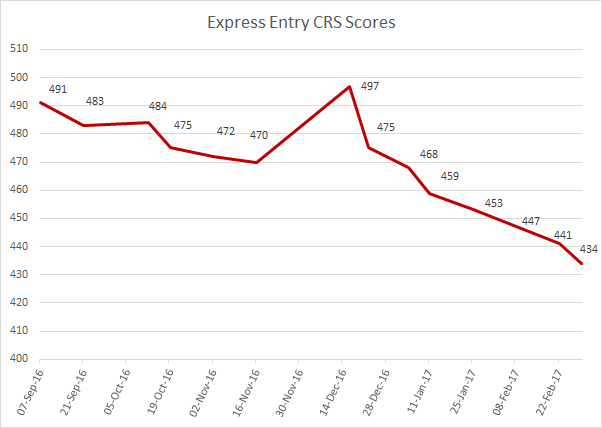
3,884 invitations to apply (ITAs) were issued today. This is the largest draw ever for Canadian Immigration through the Express Entry system. Candidates with a CRS score of 434 and above were invited to apply for permanent residence in Canada.
The Canadian government has been selecting an increasing number of Candidates the last four months, which has been lowering the CRS selection score. With the CRS score at it's lower level ever, it is easier to get PR in Canada now that it was been in a very long time.
Calculate your CRS score with our online CRS points calculator to see if you would be a strong candidate for PR in Canada. To be eligible to apply, candidates must have 1 year of full-time continuous work experience in a skilled job, which is defined by NOC 0, A or B category.
If you score 430 and above, you would be an excellent candidate for PR in Canada through Federal Skilled Worker, Federal Skilled Trade, or Canadian Experience Class.
If you score between 400 and 430, you may be eligible to apply for the Ontario PNP program which opened last week.
If you score below 400 points, you may be eligible to apply for a PNP program in a province that is looking for candidates in certain occupations. Read our recent news article for more information and to see the list of eligible occupations.
Don't have enough points? Studying in Canada is a pathway to obtain PR
If you currently do not have enough CRS points to be selected for PR, you still have the option to come to Canada and study. If you (or your spouse) enrol in a 2 year college or university program, the student can work 20 hours a week while in school, and full-time during school breaks. The spouse of a student can get a work permit and work in any job in Canada. If you have children, they can accompany you and go to school in Canada for free. After graduating from a 2 year program, the student and spouse both can get a 3 year work permit to work in Canada.
Candidates that choose to study in Canada have many options to apply for PR. Their spouse can apply for PR through a PNP program after working in a skilled job for 6 months in Manitoba province or 1 year in Alberta, Saskatchewan, New Brunswick, Nova Scotia, while their spouse is still in school. A student can apply for PR after they graduate if they have enough points, or they can work for 1 year and apply for PR under a PNP program or Canadian Experience Class.
Additional CRS points are awarded for:
• Graduating from a Canadian school (15 - 30 points)
• Having a skilled job in Canada (50 points)
• Working in Canada (points are awarded for each year you work in Canada: 35 - 80 points)
The financial requirements to study in Canada starts at $16,000 for 1 person (first year tuition + $10,000 for living expenses), and for each additional family member that accompanies you to Canada, you must have an additional $3,000 per person.
If you do not have the funds yourself, you can get a letter from a family member stating their intention to support you financially, along with their financial documents.
Candidates who are eager to come to Canada with their family, should consider studying as an option. School programs typically start in September and January each year, but there are some programs that start every 2 months. Students can come to Canada 1 - 1.5 months before their program starts, and their family can accompany them.
We can help you find a school and apply for a study permit, work permit for your spouse, and a TRV visa for your children (if necessary).
Contact us for assistance- Let us help you make Canada home.


